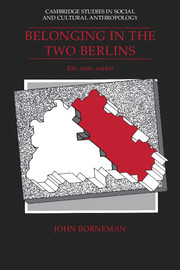Book contents
- Frontmatter
- Contents
- List of figures
- List of tables
- Acknowledgments
- Introduction
- 1 Naming, categorizing, periodizing
- 2 Clarification of concepts
- 3 Demographics of production and reproduction
- 4 State strategies and kinship
- 5 Victimization, political reconstruction, and kinship transformations in East Berlin: Generation I
- 6 Sentimentalization, fear, and alternate domestic form in East Berlin: Generation II
- 7 Hausfrauenehe and kinship restoration in West Berlin: Generation I
- 8 Politicized kinship in West Berlin: Generation II
- 9 Marriage, family, nation
- Postscript: unity
- Notes
- References
- Index
- Cambridge Studies in Social and Cultural Anthropology
5 - Victimization, political reconstruction, and kinship transformations in East Berlin: Generation I
Published online by Cambridge University Press: 05 June 2012
- Frontmatter
- Contents
- List of figures
- List of tables
- Acknowledgments
- Introduction
- 1 Naming, categorizing, periodizing
- 2 Clarification of concepts
- 3 Demographics of production and reproduction
- 4 State strategies and kinship
- 5 Victimization, political reconstruction, and kinship transformations in East Berlin: Generation I
- 6 Sentimentalization, fear, and alternate domestic form in East Berlin: Generation II
- 7 Hausfrauenehe and kinship restoration in West Berlin: Generation I
- 8 Politicized kinship in West Berlin: Generation II
- 9 Marriage, family, nation
- Postscript: unity
- Notes
- References
- Index
- Cambridge Studies in Social and Cultural Anthropology
Summary
This chapter begins the presentation of ethnographic material, shifting the focus from state strategies to individual tactics. In their autobiographical narratives, individuals reconstruct their lives with reference to ideals of self and not to principles of abstract truth. My objective here is to follow these self-techniques embodied in their personal histories. Though this account includes a range of perspectives, it remains necessarily quite partial. Therefore, one must be careful not to generalize to all Germans from the particular examples which inform my narrative. The life reconstructions in this section are based on stories of women and men of Generation I in East Berlin, born approximately between 1910 and 1935. Many members of this generation are no longer living; some now live in West Berlin. Additionally, I did not have equal access to all social and economic classes. As much as possible, I have tried to take these factors into consideration.
For members of Generation I in East and West Berlin the years from 1933 to 1945 were formative. Some had significant experiences during the Weimar years, and many had significant experiences during the Cold War. But what unites them most as a group are the twelve years they experienced, either in their late youth or as young adults, during the Third Reich. Yet belonging with reference to the Nazis, as supporter or nominal member, or even as someone in the resistance, is not a particular ideal self around which most people could construct an identity.
- Type
- Chapter
- Information
- Belonging in the Two BerlinsKin, State, Nation, pp. 119 - 154Publisher: Cambridge University PressPrint publication year: 1992



